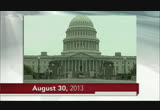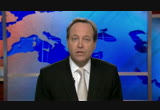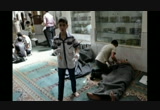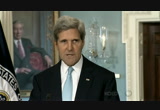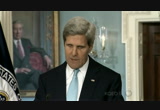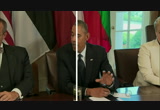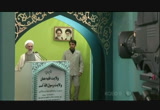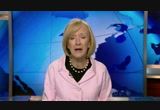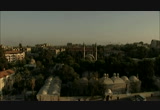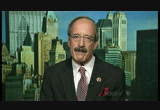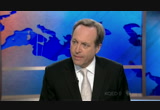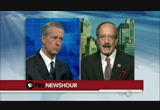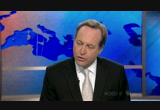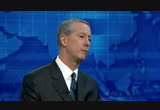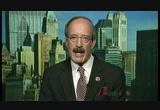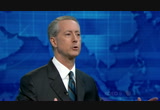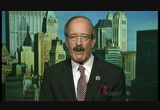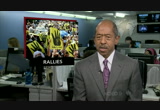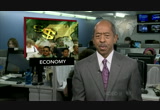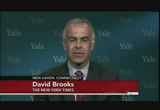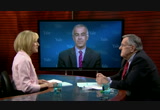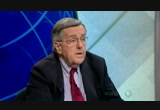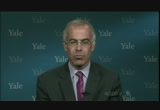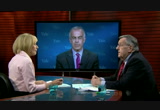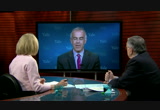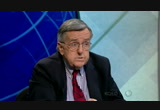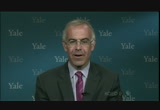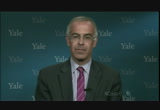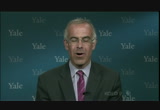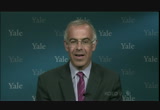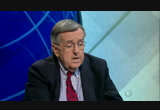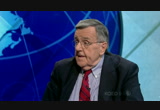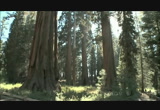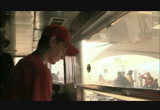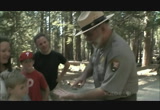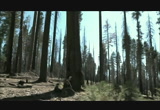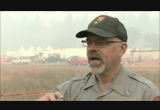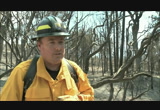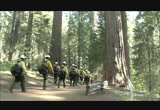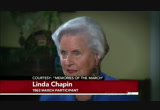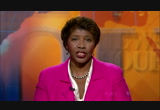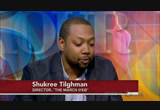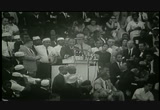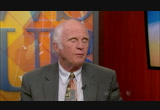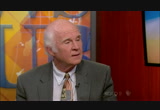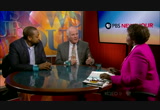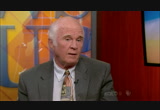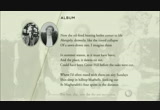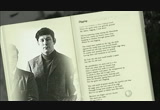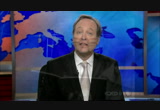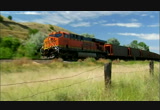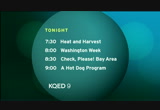tv PBS News Hour PBS August 30, 2013 6:00pm-7:01pm PDT
6:00 pm
captioning sponsored by macneil/lehrer productions >> this is the indiscriminate, inconceivable horror of chemical weapons. this is what assad did to his own people. >> woodruff: secretary of state john kerry delivered a forceful argument for taking military action against syria, as punishment for last week's attack on syrian civilians. good evening, i'm judy woodruff. >> brown: and i'm jeffrey brown. on the "newshour" tonight: we discuss the options-- and the consequences of whatever action is or isn't taken-- with two members of congress who were briefed on the evidence by the white house. >> woodruff: and we get the perspectives of "newshour" analysts mark shields and david brooks. >> brown: then, the race to save the centuries-old sequoias at yosemite national park, threatened by wildfires burning just miles away.
6:01 pm
we have a report from the scene. >> woodruff: we wrap up our look at the legacy of the march on washington, 50 years on. tonight, the long journey of the civil rights movement, and its unfinished business. >> we have this, in my view, race-based partisan gridlock that denies the possibilities that america can do what we proved we could do in the 60s, which is tackle our toughest problem. >> brown: and we remember seamus heaney-- the nobel-prize winning poet who died today in his native ireland. >> woodruff: that's all ahead on tonight's "newshour." >> major funding for the pbs newshour has been provided by: >> support also comes from carnegie corporation of new york, a foundation created to do what andrew carnegie called "real and permanent good." celebrating 100 years of philanthropy at carnegie.org.
6:02 pm
>> and with the ongoing support of these institutions and foundations. and friends of the newshour. and... >> this program was made possible by the corporation for public broadcasting. and by contributions to your pbs station from viewers like you. thank you. >> brown: the obama administration today laid out its case, in detail, that the syrian government used chemical weapons on its own people last week. secretary of state john kerry minced no words in a blunt accounting of the attack. and, president obama made clear the u.s. is still making plans for a punitive military strike. again, be advised that some of the images may be disturbing. >> the united states government now knows that at least 1,429 syrians were killed in this
6:03 pm
attack, including at least 426 children. >> brown: the chilling numbers stood out from the u.s. intelligence assessment released this afternoon. and lest anyone doubt, the secretary of state insisted, "its findings are as clear as they are compelling." >> our intelligence community has carefully reviewed and re- reviewed information regarding this attack. and i will tell you it has done so more than mindful of the iraq experience. we will not repeat that moment. >> brown: kerry said the evidence this time was drawn from "thousands of sources", and he starkly recounted u.s. conclusions about what happened august 21, in a suburb of damascus. >> we know where the rockets were launched from, and at what time. we know where they landed, and when.
6:04 pm
we know rockets came only from regime-controlled areas, and went only to opposition- controlled or contested neighborhoods. >> brown: the report told of victims stricken by spasms, foaming at the mouth and finally, death, all without any signs of any visible wounds caused by conventional weapons. >> instead of being tucked safely in their beds at home, we saw rows of children lying side by side, sprawled on a hospital floor, all of them dead from assad's gas, and surrounded by parents and grandparents who had suffered the same fate. this is the indiscriminate, inconceivable horror of chemical weapons. this is what assad did to his own people. >> brown: the secretary acknowledged that a u.n. team has been collecting samples from the alleged attack site, but he said their mission is not to pinpoint who was behind it.
6:05 pm
>> the u.n. can't tell us anything that we haven't shared with you this afternoon or that we don't already know. and because of the guaranteed russian obstructionism of any action through the u.n. security council, the u.n. cannot galvanize the world to act, as it should. >> brown: in short, said kerry, the question now is what the world is willing to do about it. and, he warned, what the united states chooses to do-- or not do -- will have profound repercussions. >> it matters because a lot of other countries whose policies challenge these international norms are watching. they are watching. they want to see whether the united states and our friends mean what we say. it is directly related to our credibility and whether countries still believe the united states when it says something. some cite the risk of doing things. we need to ask what is the risk of doing nothing. >> brown: a short time later,
6:06 pm
president obama addressed that same question as he met with leaders from the baltic states, at the white house. he said he's made no decision yet, but... >> we're not considering any open ended commitment, not considering boots on the ground approach. what we'll do is consider options that mean the narrow concern around chemical weapons, understanding there's no military solution to the underlying conflict or tragedy. >> brown: the president acknowledged divisions here and abroad over the wisdom of any attack. he said a lot of people think something should be done, but nobody wants to do it. >> i am very clear that the world generally is war weary, certainly the united states has gone through more than a decade of war. the american people understandably want us focused on rebuilding economy here and i assure you nobody is more war
6:07 pm
weary than me. but what i also believe is that part of our obligation as a leader in the world is making sure that when you have a regime that is willing to use weapons that are prohibited by the international norms on their own people, including children, that they are held to account. >> brown: any plans for a broader coalition suffered a blow yesterday when britain's house of commons voted against joining a potential military action. the vote was praised today by russian president vladmir putin, who opposes using force against syrian president bashar assad. but french president francois hollande said britain's decision will not prevent his country from joining in a strike. he told the french news paper "le monde": "the chemical massacre of damascus cannot and must not remain unpunished." meanwhile in iran, a senior cleric said any military action by the u.s. is doomed to fail. >> ( translated ): if they, americans, commit such a mistake of attacking syria, they definitely won't achieve
6:08 pm
victory, and victory will belong to the resistance and the proud nation of syria. >> brown: back in washington, members of congress-- briefed last night by white house officials-- indicated they were also divided over whether to use military force. and "the washington post" reported some current and former military officers have serious doubts, in the wake of lengthy wars in iraq and afghanistan. still, a fifth u.s. destroyer, the u.s.s. "stout", moved into the eastern mediterranean, adding to the arsenal of cruise missiles ready to be fired at syria, if the order is given. >> woodruff: in syria today, the foreign minister dismissed secretary kerry's accusations as baseless lies and a desperate attempt to justify aggression. meanwhile, the u.n. inspectors wrapped up their work, as the people of damascus braced for a possible military assault. we have a report from bill neely of "independent television news," in the syrian capital. >> reporter: their final mission: u.n. weapons inspectorl
6:09 pm
weapons were used in syria. a mission governments around the world are watching. but they went today not to the sight of attacks to talk to those who've been targeted, but to a syrian army hospital, to interview soldiers. syria's government says the soldiers were victims of poison gases. as ever, the inspectors gave little away. >> why are you here? >> because of our investigation. >> reporter: they brought in medical equipment to take samples and took statements from at least five soldiers. the syrians refused to allow journalists to talk to the troops. on the capital's streets today, they are waiting for retaliation from the united states. though many said britain's decision not to strike syria is welcome. >> for sure, if they are saying they are against these attack to syria, it's good for us.
6:10 pm
>> reporter: "britain's made the right decision," he says, "and it'll affect the americans." well, the american people, not the government. "i'm not sure it'll have any effect on the american decision," he says. "but it's good. " the u.n. mission here is now over. the inspectors will have left syria by the morning, taking their chemical samples for testing in europe. as soon as they cross the border, though, they will report to the u.n. secretary general. their initial findings may be clearer tomorrow. today, all day, the smoke and noise of explosions in damascus. syria's army shelling suburbs ready, too, for retaliation. >> brown: and we're joined by two members of congress who were briefed by the white house on last week's chemical attack in syria. congressman eliot engel from new york, the ranking democrat on the house foreign affairs committee.
6:11 pm
and republican congressman mac thornberry-- a member of the house armed services and select intelligence committee. and welcome to both of you. eliot engel, let me start with you. you said you were convince bide the briefing you got. what was the most convincing piece of evidence for you? well, i suspected even before the briefing that the assad regime was responsible for this because they kept international inspectors out of syria for four or five days. if you're wrongly being accused of having these kinds of weapons, you would want the international inspectors to come in to prove that you have been falsely accused. the fact that they kept them out, i think, just speaks legends about the fact that assad's forces were guilty. but the thing that we were told was that there were interception of high-level syrian authority, and in those interceptions, they admitted to doing this and to using these chemical weapons. and then there were certain
6:12 pm
movements of syrian personnel before the suburbs of damascus were actually hit with the gas. so it convinced me. i think it's logical. i don't think there's any kind of doubt. i think secretary kerry made a very compelling case today, and i think what the president says is also very compelling. >> brown: mac thornberry, you heard the same evidence, were you convinced? >> sure. but i think most of us believe that assad has used chemical weapons a month ago or two months ago because the evidence has been accumulating over time. this particular attack, a week or so ago, i think was on a larger scale than we have seen before. and i think the evidence is clear. so the white house's point was, the evidence is clear, and secondly, we need to do something about it. but it's that what you do about it, of course, that gets into all these other questions. >> brown: so express your concerns about what happens next. >> well, the white house point was that we need to do something about it first to preserve the president's credibility because he said there's a red line.
6:13 pm
and secondly, we need to do something about it to deter future use of chemical weapons we assad or by anybody else. so i think it's incumbent upon the president to go to congress and the american people and explain exactly what he wants to do and how it will achieve those objectives. just the desire to do something for these atrocities-- which are horrible-- is not enough. >> brown: but you're saying he has not done that yet as star-- >> he has not. and none of those questions were answered. >> brown: eliot engel, what about that? >> well, i think the war powers act qistles the president of the latitude to strike first and then go to congress within 60 days. this is precedent of past american presidents. pronald reagan did it in grenada and it was done in panama by the first the president bush. it was done in kosovo by president clinton. it was done in libya by president obama. this has happened before. as long as there is consultance
6:14 pm
with congress, as long as theree are discussion, i think it's clear the president has a right to smaik a sure and if it's more than 60 days he needs to come to congress. the people who have accused the president through these many months of doing nothing are now accusing him when he wants to do something of not doing the right thing at all. so i think the president is put in a position of beelz damned if he does and damned if he doesn't. i trust the president. i like the president. i think he's doing the right thing. we cannot arb low thugs like assad to gas his own people. it's war crimes, and we can talk about it till we turn blue, but it's time to do something about it it. and if america has the gumption to do it, well, i think that speaks legending about our country and what we stand for. >> brown: mac thornberry, do you dispute the president has the legal authority to act now? >> i think it depends on how he intends to act. but, actually, i think there's a bigger issue. rather than debating about the
6:15 pm
provisions of a particular law, i think it is important for the country that the president express why this is important, what he intendses to do about it, what his authorities are and come to congress ahead of time. and part of the reason is-- you just hear a list of things that the president says we're not going to do this, we're not going to do that. they seem to want to have a very narrow sort of military action. but you can't limit these sorts of things to just a couple of cruise missiles, necessarily. this may escalate. iran may retaliate. there may be there may be all sort of things and the president will be so much better off, the country will be so much better off if he comes and has a fuller debate and get congress' agreement with taking action here, rather than a few conference calls which seems to kind of get the feel of a "check the box" mentality. >> brown: you were with constituents in texas the last couple of days. >> i was. >> brown: what are you hearing
6:16 pm
is it are you hearing concern? >> absolutely. yesterday i had two town hall meetings. the top two questions were, "why does syria matter to us?" and "how can we trust the president?" now, i represent a different area that eliot does. but the point is, this is the time to be the president of all the people, and convince all of the people that this is in our national interest. and so far, he hasn't done that? >> brown: eliot engel, has the administration explained its position adequately. that seems to be one of the issues here. >> well, i don't disagree with mac. i think the president has to come before the american people. people. i think what we saw secretary kerry do today was the start of that. i think the president, if he acts-- and i believe he will-- will explain what he's doing to the american people. i think this will be limited in scope, and it will be done to show assad that the gassing of his own people is not acceptable. this is a war crime. those pictures of those children
6:17 pm
foaming at the mouth and dying is something that will live in my mind for the rest of my life. i just think there are certain things that are unacceptable. and this is one of them. and the united states stands for something. i commend the president for action. i think he does need to discuss this with the american people. and i think he will. >> brown: you said, mac thornberry, talking about the president's credibility being on the line. secretary kerry said it was the united states' credibility on the line. do you not accept that, and the question of if not us, then who? >> no, they're clearly connected. and we can rehash whether the president should have said there is a red line and so forth. but the argument that was made in the call today pie the administration is that the president's credibility is on the line, and it is absolutely true. if the world doubts our president's credibility, our nation stands at greater risk because a variety of factors will push and test and that is
6:18 pm
absolutely part of the danger that we're in. some people say he's backed himself into a corner. and, obviously, all of us have to live with the consequences of that. but that does not relieve him of the responsibility to persuade congress and the american people that he has specific military objectives to accomplish those it's goals that he sets, and that he is capable of dealing not only with those but with the possible repercussions that could come from any military action. >> brown: so in a word, you do not think something should happen within the next days until the president comes to the congress. >> i think the president has a lot more work to do. >> brown: eliot engel, brief last word from you? >> well, i don't think this thing can be played out indefinitely. i think that there's clear evidence that gas was used, and if we do nothing or if we fiddle and fad expel wait weeks and weeks, it will tell every despot in the world, every dictator, every terrorist organization that they can commit a mass
6:19 pm
murder, that they can commit war crimes with impunity and no one is going to say anything. we're all going to be talking and talking and not acting. i support the president in acting. i think he's doing a good thing, and i think we all should get around him. >> brown: all right, eliot engel, mac thornberry, thank you both very much. >> thank you. >> woodruff: we'll continue our look at options for syria with mark shields and david brooks. also ahead on the "newshour": saving yosemite's giant sequoias; the legacy of the march on washington and remembering seamus heaney. but first, the other news of the day. here's kwame holman. >> holman: supporters of ousted egyptian president mohamed morsi staged their biggest protest today, since a military crackdown two weeks ago killed hundreds. by the thousands, they marched through cairo and other cities, demanding an end to military- dominated rule. most marches ended without incident, but there were some clashes, and several deaths. still the crowds remained defiant.
6:20 pm
>> ( translated ): we are here and we are unarmed as you can see. we have nothing and they are the ones who are hitting us with tear gas and hitting us with live fire. >> ( translated ): i am here today to tell military chief general abdel-fatah el-sissi that we will not be scared of your tanks and your soldiers. you may put us all in prison as much as you like. we will not kneel. >> holman: many leaders of morsi's muslim brotherhood have been arrested in recent weeks, and that had put a damper on demonstrations, until today. the mayor of san diego, bob filner, officially stepped down today after being accused of multiple instances of sexual harassment of women. 19 women have gone public with accusations he groped them or made unwanted sexual comments. the former ten-term congressman was less than nine months into his term as san diego's first democratic mayor in two decades. he announced his resignation last week. a special election for a new mayor is set for november. in economic news, consumer confidence has slipped this month, after hitting a six-month high in july. a university of michigan survey found americans are less confident the job market will
6:21 pm
improve in the coming months. on wall street, stocks finished august on a down note. the dow jones industrial average lost 30 points to close at 14,810. the nasdaq fell 30 points to close below 3,590. for the month, the dow lost more than 4%. the nasdaq fell 1%. those are some of the day's major stories. now, back to judy. >> woodruff: and to the analysis of shields and brooks. syndicated columnist mark shields and "new york times" columnist david brooks, joining us from yale university. gentlemen, welcome to the program. david, to you first, has the obama administration made a compelling case for going into syria? >> not public. but i do think they have a compelling case. you know we have an international system here. we all profit from it, trade profits from it, peace-- we can travel around the world because of it. and part of that system is certain ideas, the certain ideas you can't invade other countries for no reason. you can't commit genocide. rogue regimes can't have nuclear
6:22 pm
weapons and you can't gas your own people. if we ignore those basic standards our international system basically begins to erode. i think what he's doing is probably the least-bad option. they're all pretty terrible. if we armed the opposition, that might have been a good idea a couple of years ago but they're too rabid now. if we have a no-fly zone that will make us look weak. i think the president is basically trying to, one, establish the norm, that you can't gas your own people. and finally just to establish the idea that we will strike out and try to change their calculus. there are certainly dangers down the road but i think the loss of the credibility as we try to face iran and other countries would be more immediate and more realizable, and, therefore, he more or less has to do what he's doing. >> woodruff: mark, how do you see it? has the president made the case? >> i don't think so, judy. i think the president, and particularly the secretary of state, john kerry, today made a very strong case about what has
6:23 pm
been done is abhorrent. it is unacceptable. it does-- it cannot go unpunished. but at the same time, i don't think there's a case been made as to what we will do other than to punish in some way the syrian regime for doing it, and to make ourselves feel better. i mean, i don't eye don't see-- there's no regime change. there is no u.s. troops or coalition troops. there's no coalition troops. it's to be short and over, and i think as general anthony zinni said, you can't be a little bit pregnant. you can't-- one and done-- that is you, you go in and send in the missiles and you feel better and you put some damage and some hurt upon the other side-- but it is not a long-term solution. >> woodruff: david, what about that? this argument that, yes, the united states can go in, make a
6:24 pm
point, punish the assad regime, but not really change anything on the ground? >> well, i don't know if-- as awful as that regime is i'm not sure we necessarily want to top tele, given alternatives, which is anarchy. the second thing sthey're decision makers so you're trying to change their calculus. if you raise the cost of doing what they're doing there's a chance they won't do it again. that does happen and has happened may be times in world history. they raise the costs and they tonight do it again. there is a chance they will do it again and we'll have to make another call, do we want to escalate. and that's clearly a danger. i do think the idea if the u.s. says something about weapons of mass destruction, whether in iran or syria, and we do nothing, then the entire nonproliferation regime chrkt u.s. has basically been leading for the past accept the or 80 years, that begins to fray badly, and the costs down the road are much worse. so raise the costs for assad, and then see what happens. >> woodruff: what about that, mark? >> i'm just not sure, jied, how the costs are being raised. i mean, by simply hitting him
6:25 pm
with missiles one time, twice-- what's been emphasized over and over again is how short this is going to be. it's not open-ended. i just don't understand-- you know, we've gone through this-- what the president fighting is exactly what prime minister cameron is fighting and that is it's the legacy, the poisoning of the well from iraq. and it's only 11 years ago this very week that the environment of the united states said, "i can assure you they have weapons of mass destruction, that saddam hussein is going to use them against us, against our allies and against our friends." so, i mean, there's a skepticism about the military effectiveness, about what happens, whether it can be limited, and what it does achieve. i don't think anybody could argue that iraq and afghanistan are substantially better off after all the american sacrifice, and all the american
6:26 pm
treasure, and i think you may be able to make the same case for libya. so i think there is a big burden of proof for the president to make in this case. >> woodruff: david, is that the burden you see for the president? is that what he's got to do in the next few days, or however long it is, before they do something? >> well, if people want to take a time machine back to 2003 and have those debates again, that's fine. but that's not what we're deeg woow here. this is a pretty clear case, i think. now, having said that, i think the president and probably all americans are chastened by how much good and how much we can possibly effect the middle east. and, clearly, that's the stfort afghan surge the story of iraq. we are keenly aware of how much good can be done, how much we can change a region which is devolving into a series of sectarian wars. and so we're not going to go in there and get in the middle of that. nonetheless, i do think we can put some parameters on the wars by at least outlawing certain sorts of weapons. if he's going to be free to shoot as many people as he
6:27 pm
wants, i guess. we can do that. and the second thing we can do which i think is more crucial is put some walls around syria. it's spilling over into iraq and lebanon. it's turning into a regional proxy war. if we can tamp that down a little, we'll have done some good. the probable reality is this thing is just going to have to burn itself out and there's probably not much we can do about it. we should not get in the middle of it. but if we can fut some limits on it, that's some positive small good. >> woodruff: on top of, that both the president and secretary kerry are saying it's in the u.s. national interest to do this. the u.s. doesn't want chemical weapons turned around and use us. >> we don't want chemical weapons in the world, we don't. it's since world war i there has been a consensus on this. david can talk about 2003. but, judy, the american people are not in support of this. they are not informed on it. it is the responsibility of leadership to make that case. 80% of americans in the "wall
6:28 pm
street journal"/nbc poll today said they want the president to go to the congress on this. and so-- >> woodruff: do you think that's a mistake not to go to congress? >> i certainly do. the congress is no day at the beach. let's get that straight. from the 5th of august until the first of october, they'll number session nine days. at the very least i thought speaker boehner raised questions, that speaker pelosi endorsed in his letter to the president. but i think this is a debate, and i think speaker boehner and senate majority leader reid ought to call back. folks, this is the end of the town meeting. this is an important national decision and it ought to be debated openly. >> woodruff: david, how do you see the question of whether they should go to congress and public opinion. >> well, we've been violating the constitution on this for my enstier adult life. the presidents of both parties have been pretty much violating the constitution and going to war, andig the war powers act as eliot engel said early the in
6:29 pm
the program gives you 60 days but this has been trample ever since i have been covering politics. if we did rely on congress for all these things, nothing would get done. so that's why we've fallen to this ugly de facto program. i would say, also, that if we are in a period of permanent withdrawal from the middle east, what has happened over the last really year in the middle east, which is the devolution from the arab spring to the arab winter. in retrospect-- and i was not a big champion of this at the time-- but john mccain and lindy graham had a point earlier on in the progress of the civil war, if we had been a little more interventionist when the opposite was more moderate and controllable, that would have been a good time to act. the idea by not acting things are going in our direction is refuted by the facts of the past couple of years. >> i hate to say it. david's wrong. i know david is young but he was alive in 1991. if you want to see a conscious formed, if you want to see a
6:30 pm
debate held, george herbert walker bush was president of the united states, jim baker was secretary of state, and they debating going in driving saddam hussein from qu wait where back to baghdad. it won the support of 31 nations. it won the supportave democratic congress. it won the support of united nations, and it won the summit of the american people overwhelmingly. sp that is the way to do it. just because presidents have tried to short circuit it from grenada to iraq now to syria since, if anything that's a modeled for failure, judy. >> woodruff: should-- >> i would say, i'd be in favor of going to the congress. i do agree with that. i have no problem with that and i think this case is actually kind of similar to the iraq war of 1991 in that it was a clear violation of international norms. i'm not sure i'd want to wait for the whole process to play out before we did anything and the war powers act allows for this because that really does look like it delays our reaction so distantly from the atrocity.
6:31 pm
>> woodruff: but what about mark's point about having a-- more of a coalition, having more countries? great britain will not be on board. a number of other countries have said they will not join in. how much does this matter that there will not be many allies, and certainly there won't, apparently, there won't be a u.n. signing off on this. >> militarily, it doesn't matter at all. i mean, you can find some british and french sailors and stick them on the thing but they don't really add much. these are american forces that only have the capacity to do this. as for international legitimacy, listen, gassing your oab people is not a close call, as far as i'm concerned. that-- that demabz a response. i thought that was pretty much celsed since world war i. the fact that other countries don't want to sign on-- and by the way a lot do want to sign odo support the idea-- that-- that doesn't seem morally problematic when you have the atrocity in a case this clear. to me the the tough call -- and i agree with mark on this-- the tough call is not whether
6:32 pm
something-- some gross violation of international law was done. the tough call is whether or not weather what we do, lobbying a few cruise missiles will do enough good, and i'm certainly persuadable that it will do no good but the idea that we should do nothing, that to me is a debate that is pretty clear. >> woodruff: he's argue, what happened is so horrible, that even-- even if these measures don't-- >> mien-- >> woodruff: change anything. >> what was done was ablornt and unacceptable, judy. my point is, is this the practical response? david appears to be saying there are other countries that want to hold our coat. there are none that want to get involved. we're with you, but don't tell anybody we're on your side, basically. we're not going to go public with our support because it's going to affect our own domestic population. no, judy, i think it is-- it is-- it does cry to heaven for vengeance, but i want to do this in a way that does in fact make
6:33 pm
sense for the united states and makes sense for this poks because the position that chemical weapons are unaccept expabl intolerable is not, i don't know, validate or vindicated by one and done, going in and throwing someimisms at them, which are significant weaponry, but at the same time oorkts over. and if that ends up emboldening the regime saying, "look, we'll withstood the west, we withstood the united states." >> mark, do you think we should do more? >> i think the president has a responsibility to make the case, david owhat he wants-- what he intends to do, what his objective is, beyond just getting by this sense of "we have to do something." and i don't-- i don't get that, at least from the debate thus far. and i really think the first step is to go to congress and doing the war powers act, and employing the war powers act, acting, and then going to congress i think is the worst of
6:34 pm
all possible worlds. >> woodruff: we hear you both, mark shields, david brooks, thank you. >> thank you. >> brown: firefighters in california reported more progress today in the two-week battle against a huge wildfire near yosemite national park. a "newshour" team has been covering one of their top priorities: protecting an ancient grove of giant seqouias in the park. kwame holman narrates this report. >> we're almost to the big tree. >> holman: even as wildfires raged miles away on the other end of yosemite, a steady stream of visitors this week hiked up a scenic trail to see one of the parks biggest attractions-- the giant sequoias. these massive trees, which are unique to california's sierra nevada mountains, are among the oldest living organisms on earth. the grandest in yosemite's mariposa grove is the so-called grizzly giant, estimated to be
6:35 pm
1,800 years old and it's no stranger to fire. many here bear huge black scars from natural wildfires that have burned through these forests for thousands of years. but now an unprecedented fire-- the largest in sierra history-- is threatening two of yosemite's three giant sequoia groves. the rim fire, which has consumed more than 300 square miles since it began on august 17, is burning near the tuolumne and merced groves in the northwest corner of the park. more than 4,000 fire fighters from around the country have been battling the intense blaze. many work out of the incident command center near the fires front lines just outside yosemite. it's a sprawling temporary city where crews can get grub and rest between shifts. and this is where officials have been closely monitoring the fires advance toward the sequoias.
6:36 pm
>> the fire is still about five miles away from the groves, getting a little closer every day. >> reporter: tom medema speaks about the fire for the national park service, which has taken steps to try to protect the trees. >> we've done work there setting out sprinklers where we can moisten fuels so they are not as receptive to those embers that are coming in. we've got firebreaks that are built in. and then there's also in the merced grove a really important historic structure; one of the first ranger cabins in the park. and we've wrapped that in a fire retardant material to protect that. >> reporter: at the parks mariposa grove, a safe distance away from the fire, visitors expressed concern for the threatened trees. >> they've been here for so long. they are just a part of the state and a part of america and who we are. to lose them would be just awful >> what's amazing is that one of these can sprout from one of these. these are each sequoia seeds >> reporter: dean shenk has been a ranger in yosemite for 40 years. he educates the public about the
6:37 pm
park's iconic giants. since the rim fire began, shenk has answered a lot of questions about how the sequoias cope with fire. like rain, you want a little bit of rain but you don't want too much. this is too much fire. lawye >> reporter: shenk says the mighty trees have their own defense mechanisms against fire including a natural flame retardant in their thick bark, which do a pretty good job of defending them from most fires. >> it's rare to find a giant sequoia without a fire scar. the bark at the base of a giant sequoia can be four feet thick but as it goes up 40 feet it can thin to two. >> reporter: at a nearby stand of young sequoias, shenk explained how a prescribed burn- - a low-intensity fire set and controlled by park staff which have been standard practice in the park for 40 years-- actually helps the trees reproduce. >> we're looking at a grove of sequoias about 14 years old and
6:38 pm
all of them owe their existence to a prescribed burn we had here 15 years ago. the natural forest that was on top of the forest floor was burpd away, recycling nutrients, allowing for lots of sunshine towards the seeds that were disbursed shortly after the fire any we have a great rejuvenation pocket right here in the misof the mariposa groves. >> reporter: but while the giant sequoias in yosemite park have been enduring fire for centuries-- even thriving because of it-- those fighting the rim fire say this blaze poses a significant threat to the trees, burning hotter and >> in this type of fire, the flames that you see in the news are these crowning flames that are going up in the tops of the tree-- the crown of the tree. it's going tree top to tree top, and it is much more devastating because it is killing all the green growth as opposed to burning just dead stuff on the ground. so we need to try and take measures to knock this down before it can get into the crowns of the giant sequoias.
6:39 pm
>> you can see here behind us, these trees and this brush was totally consumed by flames. >> holman: john wallace is a forest fuels specialist with the u.s. fish and wildlife department. he says the intensity of the rim fire is due, in part, to years of forest management policies, largely in land outside the park, which suppressed naturally occurring wildfires. >> everything out here, when it falls on the ground, becomes a fuel. years and years of suppression have let fuels build up to a level that's unnatural. and so the last 15 years or so, the department of interior and forest service have gone in and really tried to manage those build-ups. and introduce and this is one of those areas they haven't gotten to yet. >> holman: wallace says that while the rim fire is a
6:40 pm
particularly devastating wildfire, such mega-fires are becoming the norm, rather than the exception. >> these fires are just becoming more and more common now. since 2000 we've had all these 500,000 to 600,000 acre mega fires. before 2000, a 100,000-acre fire was huge. and then we've got these high fuel loads in a lot of places and that's contributing to these bigger, more intense fires. >> holman: officials say they are starting to get a handle on fire which is now about 30% contained and they hope to have it fully contained by the end of september. until then, crews stationed near the giant sequoias are standing by, ready to put up a big fight, if needed, to save these national treasures. >> brown: on our science page, read how a century of fire suppression has made fires worse for the legendary giant sequoias.
6:41 pm
and take a look at behind-the- scene photos from our reporting. >> woodruff: now, we wrap up our coverage of the 50th anniversary of the march on washington. first, long-time civil rights activist linda chapin of orlando, florida, recalls coming to the capitol as a 22-year-old. >> it was, as much as anything, for my group of friends who met up in washington the day before. it was exciting. it was passionate. it was fun. all of those things. and we didn't know that it would come together to be one of the largest protests in the history of the united states. and another thing that interests me greatly is that the organizers didn't all have the
6:42 pm
same goal. some of them were there to support president kennedy's civil rights act. some of them were going there to say, "no, we don't support that. it's not strong enough. of some of them were there to say something different. and, yet, it all came together in this incredibly symbolic and historic event. >> brown: that was linda chapin of orlando, florida. you can find her story and other firsthand accounts, at "memories of the march" on the pbs website, "black culture connection." now, gwen ifill has the final installment of her series of conversations on the march. >> ifill: from james madison's condemnation of slavery in 1813, to lincoln's gettysburg address in 1863, to woodrow wilson's endormts of segregation in 1913, and to reverend martin luther king jr.'s words at the lincoln memorial in 1963, key moments in america's journey toward freedom have played out in what
6:43 pm
historian taylor branch describes as 50-year blinks, but 50 years after king talked about his dream, has america fulfilled the demands made by those who marched on washington? a new documentary, series, the march@50" explores this question on the pbs web site "black culture connection." shurkee hassantilghman is the director of that series, and he joins us. along with taylor branch. welcome to you both. we're here to talk about unfinished business 50 years after the march. you were born shukree, in 1979, so this wasn't even part of your growing up. but you did learn about the demands made that day. were they met? >> 50 years later we can look at the unemployment rate among african americans, this is stubborn, consistently twice that of their white counter parts. also other segregation in public schools, for example.
6:44 pm
we've gotten a trend now because of sort of lack of desegregation, and overturning of desegregation plans in the 90s, we've got a place now where our in our public schools we're reseg dwaiting along racial and ethnic lines and also along class lines. >> ifill: 50 years after "brown versus board of education" which was supposed to ensure the integrated school system, has it failed? >> i think it would be tough to say it failed. one of the experts we talked to, gary warfeel, talks about this in the series. we are at a place where 80% of black and latino students go to schools that are majority non-white. about 50% go to schools that he calls apartheid schools, meaning they are 98%, 99%, all black or all latino, nonwhite. only within a couple of percentage points, if there was a law that made them be
6:45 pm
segregated by race and class. >> ifill: let's talk about mass incarceration. one in nine african americans are in the prison system in some manner. is that also a failure? >> well, i-- >> ifill: let's say an unkept promise. >> in some ways. incarceration really started to increase in the early 70s. so this was well after the march on washington. but when you think of notions, the second part of the march-- freedom-- it's hard to think about freedom when we have that many people who don't have their freedom and are locked up. >> ifill: taylor branch, he was born in 1979. i won't ask when you were born but you do write you grew up fearfully oblivious to race and yet you write about the civil rights movement. how did that come to be? >> i think it was an accident of my cohort. my formative years-- the "brown"
6:46 pm
decision i was in first grade. i was a senior in college when martin luther king was killed in the spring of '68-- all in between the movement was just relentless. and it ultimately changed direction of my life's interest against my will. i grew up in a nonpolitical family but by the time i was in college i was stoupified for this movement that dr. king called equal souls, equal votes. it went deep. >> ifill: many people never heard a full martin luther king speech other than that day at the linkon memory. but he never planned to talk about the dream in that speech dhe? >> none of the words of the "i have a dream "was in the carefully prepared speech that he labored over. he got towards the end of it was and it was labored and he threw it away for a common refrain of a broader sense, a broader dream with a lot of anguish in it. but it reached a larger audience. >> ifill: did that redefine
6:47 pm
the way america defind the civil rights movement? >> i think that was part of the great function of the march on washington was that it showed america that american americans could present grievances and that they could frame them in a way that everybody could relate to that was really even larger than race. they were centered in race but they grew larger which is why so many good things came out of civil rights era that affected women and disabled and many, many other groups beyond strictly black and white. >> ifill: dr. king also wrote famously in a bert from the birmingham jail, for americans to be on tip-toe stance, especially for leaders of the movement, and especially our first black president. is he on tiptoe stance in comparison to the careful path liewlt lute jr. had to tread as well? >> i'm afraid so. what dr. king was saying, if you grow up black, you have to be on tiptoe stance because you never know in a white world how people are going to take things, but
6:48 pm
you have to watch out for that. what he's saying is we're a healthier society if everybody is looking out and wondering and reaching across lines to think how they're doing. i think we're still in a situation now where most white americans expect the black president to be black on their terms and not talk about being black. so he has to stay on a tiptoe stance and it's very controversial if he mentions his own experience. >> ifill: so should he be talkintalking about race more te has? >> i think he should. race has as you been the key defining point in american freedom and what we mean by it. that's what i meant by the 50-year blinks from madison forward. >> ifill: in one of our earlier conversations leading up to the march anniversary, i talked to bicari sellers, a state representative in south carolina, and the son of a famous civil rights activist in south carolina, and he says he now takes the 50,000-foot view where he looks at a more braid way of what black, white, race,
6:49 pm
equality, availability, accessibility-- all those things he's has the luxury to look at the big picture. as you look at the big picture, shukree, are you optimistic or pessimistic wherery with 50 years after the march? >> i'm naturally optimistic so i'm going to say opt nisk. >> ifill: you department sound optimistic. >> that's the beauty of the thing. given all the statistics and everything there's been enormous progress. you're not a student of history if you don't recognize that we do not live in the same world that we lived in, in 1963. but the best way to honor those people who marched and the leaders of that march is to recognize the work that still has to be done. that's what we try to do with the series, and i think that's what people who care should try to do. >> ifill: taylor? >> i think we have an imbalance. i think the 50-year blink, we have suspendous progress for not only black people, for the white south, for women, for all kinds of groups, but that our politics
6:50 pm
has atrophied and we're paralyzed. we don't see that. we have this, in my view, race-based partisan gridlock that denies the possibilities of what america can do which we proved we could into in the 60s, tackle our partisan problems. >> ifill: you think the gridlock is race based? >> absolutely, there's no question. the average republican district has 50% more white people. the average democratic district in the congress has twice as many non-whites. partisan gridlock is racial-- the biggest unexamined question in american politics is why and what we're going to do about it? we just accept partisan gridlock as part of our cynical inheritance. we shouldn't do that. we should say, "is it racial, and if so, why, and how can we get around it?" i blame both sides. i think both sides don't-- are gridlocked right now is basically saying the only solution is for the other side to drop dead and that's not going to happen. >> ifill: i'm glad at least you two are talking and thinking
6:51 pm
about it. >> woodruff: online, find our full coverage of the anniversary, including some of the major speeches from wednesday's ceremony at the lincoln memorial. >> brown: finally tonight we remember the world-renowned poet and nobel laureate, seamus heaney. he died earlier today after a short illness in his native ireland. two years ago i sat down with heaney in new york, as he looked back on his life and work. here's an excerpt. it starts with heaney reading a section from his poem, "album," about his parents. >> "now the oil-fired heating boiler comes to life abruptly, drowsily, like the time collapse of a sawn-down tree. i imagine them in summer season, as it must have been.
6:52 pm
and the place it dawns on me could have been grove hill before the oaks were cut, where i would often stand with them on airy sundays, shin-deep in hilltop bluebells, looking out at magherafelt's four spires in the distance. too late, alas, now for the apt quotation about a love that's proved by steady gazing, not at each other, but in the same direction." >> brown: heaney grew up in a rural family farmhouse called mossbawn in northern ireland. he was the first of nine children who lived a life very grounded in the soil. his famous early poem titled "digging" portrays his father working the earth with a spade and ends with an announcement to the world that he, the young poet, will use a different tool. "between my finger and my thumb, the squat pen rests. i will dig with it." in his nobel address, he spoke
6:53 pm
of making a life journey into, quote, "the wideness of language." >> the first poetry a writer feels he can trust and come to a point that you think that is a poem, that is a life-changing experience. >> brown: do you remember that? >> i do, yes. it was certainly when i wrote "digging." you know, i felt-- when you're beginning, you're not sure. i mean, is this a poem? or is it just a shot at a poem? or is it kind of a dead thing? but when it comes alive in a way to feel that's your own utterance, then i think you're in business. >> brown: or here he is reading >> brown: seamus heaney was 74 years old. online you can find our complete
6:54 pm
profile of the poet and you can watch him read one of his best-known works, "death of a naturalist." >> woodruff: again, the major developments of the day: secretary of state kerry laid out the u.s. case, in detail, that the syrian government used chemical weapons on its own people last week. and, president obama said any military action would be narrow and limited in scope. in egypt, supporters of ousted egyptian president mohamed morsi staged their biggest protest since a military crackdown two weeks ago left hundreds dead. >> brown: now to kwame holman for what's online. >> holman: elderly parents aren't always able to manage their own finances. but how do you make sure their savings last without encroaching on their independence? our economics correpsondent paul solman shares his own experience. all that and more is on our website newshour.pbs.org. judy? >> woodruff: and that's the "newshour" for tonight. but before we go, a reminder-- there's something new coming from the "newshour." we're launching pbs "newshour" weekend, anchored by vicky
6:55 pm
hartzler. every saturday and sunday, he will take a look at stories from around the country and around the world. look for the pbs "newsr" weekend right here starting saturday, september 7. i'm judy woodruff. >> brown: and i'm jeffrey brown. "washington week" can be seen later this evening on most pbs stations. we'll see you online and again here on monday evening. have a nice holiday weekend. thanks for joining us. good night. >> major funding for the pbs newshour has been provided by:
6:56 pm
>> and with the ongoing support of these institutions and foundations. and... >> this program was made possible by the corporation for public broadcasting. and by contributions to your pbs station from viewers like you. thank you. captioning sponsored by macneil/lehrer productions captioned by media access group at wgbh access.wgbh.org
7:00 pm
this is nig"nightly busines report" with tyler mathisen and susie gharib brought to you by. >> sailing through the heart of historic cities and landscapes on a river, you get close to iconic landmarks, to local life, to cultural treasures, viking river cruises, exploring the world in comfort. >> the world has an obligation to make sure that we maintain the norm against the use of chemical weapons. now i have not made a final decision about various actions that might be taken to help enforce that norm, but as i've already said, i have had my military and our team look at a wide range of options. >> will he or won't he? the white house lays the
269 Views
IN COLLECTIONS
KQED (PBS) Television Archive
Television Archive  Television Archive News Search Service
Television Archive News Search Service 
Uploaded by TV Archive on

 Live Music Archive
Live Music Archive Librivox Free Audio
Librivox Free Audio Metropolitan Museum
Metropolitan Museum Cleveland Museum of Art
Cleveland Museum of Art Internet Arcade
Internet Arcade Console Living Room
Console Living Room Books to Borrow
Books to Borrow Open Library
Open Library TV News
TV News Understanding 9/11
Understanding 9/11
